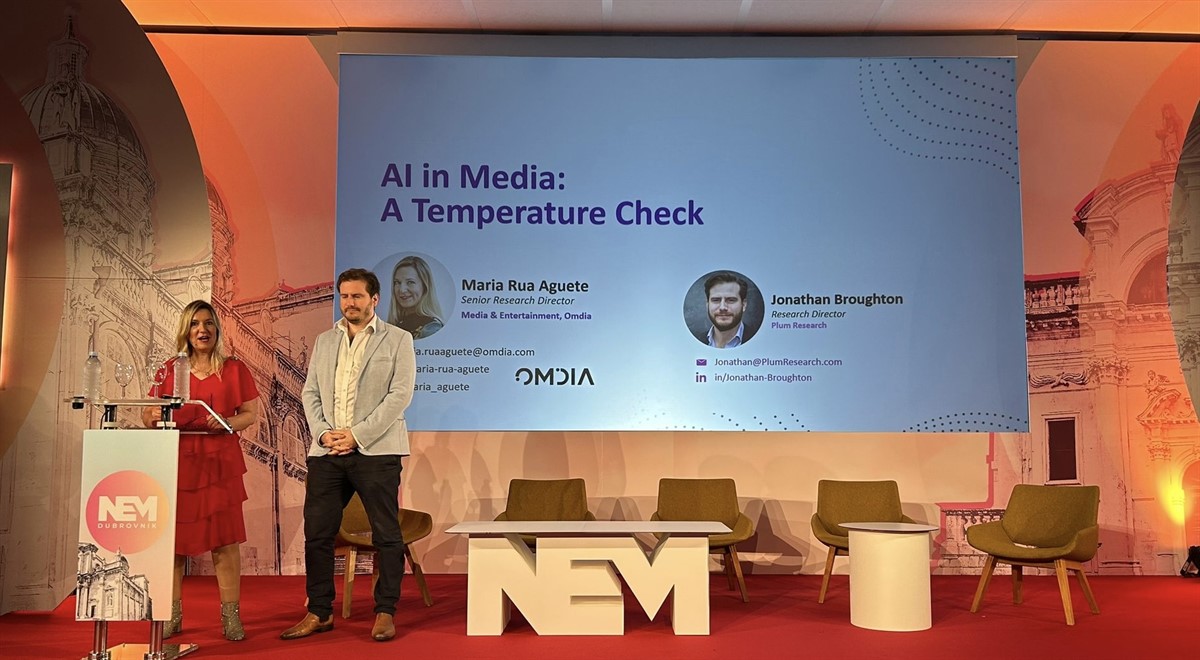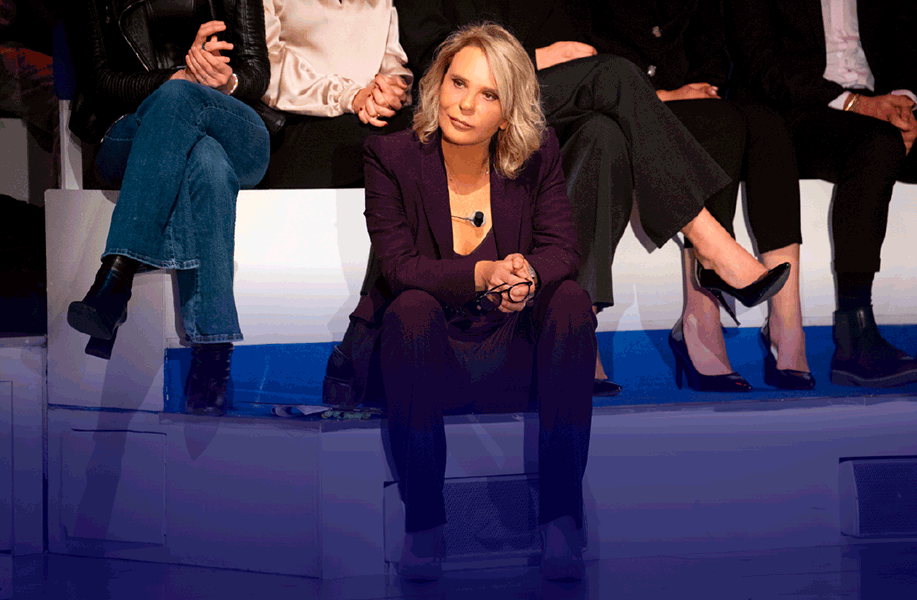Demystifying AI in Media: An Introduction to the Future.
As Artificial Intelligence (AI) is rapidly transforming the media and entertainment (M&E) industry, Aguete delved into the current state of AI adoption in media, the drivers behind its uptake, the benefits and challenges, and the future outlook for AI in this dynamic field.
"The media industry has shown a burgeoning interest in AI due to its potential to revolutionize various aspects of content creation, distribution, and consumption - she said -While some negative headlines predict job losses, many positive aspects highlight AI’s transformative power. At the Cannes Film Festival, a mini-survey revealed that 80% of attendees would watch a movie made by AI, indicating a strong acceptance of AI-generated content.
AI is seen as the most transformative technology in the M&E sector. According to Omdia's 2023 Horizons Enterprise Survey, AI, machine learning (ML), and cognitive automation technologies are anticipated to have the most significant business impact within the next five years, surpassing other innovations like blockchain, quantum computing, and the metaverse.
Confidence in AI's ability to add value is on the rise across various industries, including M&E. A survey revealed that 63% of respondents from the M&E sector reported increased confidence in AI over the past year. Enterprises in Latin America and Asia Pacific lead in the reliance on managed services for generative AI (GenAI) deployment, particularly in the energy, utilities, healthcare, and pharma sectors.
Consumers are already familiar with AI-powered features in TV and video. Omdia's 2023 Consumer AI survey shows significant interest in AI applications like personalized recommendations, automatic dubbing, and voice interaction with TVs. However, concerns about data privacy, misinformation, and the impact on creativity and jobs persist.
Despite the enthusiasm, several barriers hinder AI adoption in enterprises. These include lack of management buy-in, unclear ROI, data quality issues, and compliance concerns. Overcoming these challenges requires strategic planning and investment in AI infrastructure and talent.
AI spending in the media sector is projected to exceed $13 billion by 2028. The investment will be distributed across analytics, development and delivery, and customer experience enhancement. Key areas include game outcome prediction, dynamic content creation, and personalized media recommendations.
AI is revolutionizing pre-production, production, and post-production processes. In pre-production, AI storyboarding software accelerates the creation of storyboards from textual prompts, enhancing creative workflows. During production, AI tools assist with automatic transcription and synchronized camera and audio streams. In post-production, AI enables advanced visual effects, efficient video editing, and improved localization through automated captioning and dubbing.
AI optimizes media distribution by tracking and substituting assets, enabling new opportunities for localization and advertising. For instance, Amazon's Zero-Shot Virtual product placement project demonstrates how AI can monetize content by replacing 2D assets in videos with localized advertisements.
AI enhances cinema operations by optimizing screen scheduling and movie selection based on audience preferences. Vue CEO Tim Richards highlighted that AI allows the screening of more foreign language films, thereby broadening the audience base.
The trend is moving towards smaller, more specific AI applications that are efficient and precise. While AI excels at interpolation and probabilistic choices, it still cannot replace human creativity entirely. The future focus will be on integrating AI to assist with tasks and enhance creative processes rather than replacing human roles.
Maria Rua Aguete added: "AI is undeniably changing the landscape of the media and entertainment industry. As enterprises overcome adoption barriers and consumers become more accustomed to AI-driven features, the technology's potential to revolutionize media production, distribution, and consumption will continue to unfold. The key will be to balance AI's capabilities with human creativity, ensuring that AI serves as a powerful tool to augment and not replace the creative process.
"The media industry has shown a burgeoning interest in AI due to its potential to revolutionize various aspects of content creation, distribution, and consumption - she said -While some negative headlines predict job losses, many positive aspects highlight AI’s transformative power. At the Cannes Film Festival, a mini-survey revealed that 80% of attendees would watch a movie made by AI, indicating a strong acceptance of AI-generated content.
AI is seen as the most transformative technology in the M&E sector. According to Omdia's 2023 Horizons Enterprise Survey, AI, machine learning (ML), and cognitive automation technologies are anticipated to have the most significant business impact within the next five years, surpassing other innovations like blockchain, quantum computing, and the metaverse.
Confidence in AI's ability to add value is on the rise across various industries, including M&E. A survey revealed that 63% of respondents from the M&E sector reported increased confidence in AI over the past year. Enterprises in Latin America and Asia Pacific lead in the reliance on managed services for generative AI (GenAI) deployment, particularly in the energy, utilities, healthcare, and pharma sectors.
Consumers are already familiar with AI-powered features in TV and video. Omdia's 2023 Consumer AI survey shows significant interest in AI applications like personalized recommendations, automatic dubbing, and voice interaction with TVs. However, concerns about data privacy, misinformation, and the impact on creativity and jobs persist.
Despite the enthusiasm, several barriers hinder AI adoption in enterprises. These include lack of management buy-in, unclear ROI, data quality issues, and compliance concerns. Overcoming these challenges requires strategic planning and investment in AI infrastructure and talent.
AI spending in the media sector is projected to exceed $13 billion by 2028. The investment will be distributed across analytics, development and delivery, and customer experience enhancement. Key areas include game outcome prediction, dynamic content creation, and personalized media recommendations.
AI is revolutionizing pre-production, production, and post-production processes. In pre-production, AI storyboarding software accelerates the creation of storyboards from textual prompts, enhancing creative workflows. During production, AI tools assist with automatic transcription and synchronized camera and audio streams. In post-production, AI enables advanced visual effects, efficient video editing, and improved localization through automated captioning and dubbing.
AI optimizes media distribution by tracking and substituting assets, enabling new opportunities for localization and advertising. For instance, Amazon's Zero-Shot Virtual product placement project demonstrates how AI can monetize content by replacing 2D assets in videos with localized advertisements.
AI enhances cinema operations by optimizing screen scheduling and movie selection based on audience preferences. Vue CEO Tim Richards highlighted that AI allows the screening of more foreign language films, thereby broadening the audience base.
The trend is moving towards smaller, more specific AI applications that are efficient and precise. While AI excels at interpolation and probabilistic choices, it still cannot replace human creativity entirely. The future focus will be on integrating AI to assist with tasks and enhance creative processes rather than replacing human roles.
Maria Rua Aguete added: "AI is undeniably changing the landscape of the media and entertainment industry. As enterprises overcome adoption barriers and consumers become more accustomed to AI-driven features, the technology's potential to revolutionize media production, distribution, and consumption will continue to unfold. The key will be to balance AI's capabilities with human creativity, ensuring that AI serves as a powerful tool to augment and not replace the creative process.












